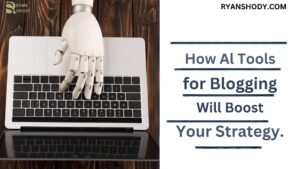In 2025, businesses are increasingly turning to the Best AI Tools for Businesses to streamline operations, enhance decision-making, and stay competitive in a rapidly evolving market.
These tools, ranging from automation platforms to advanced analytics, are not just a trend but a necessity.

Understanding the Best AI Tools for Businesses is crucial for any organization looking to optimize its processes, reduce costs, and drive growth.
In this article, we’ll explore what these tools are and how they can transform your business.
What Are the Best AI Tools for Businesses?
The Best AI Tools for Businesses encompass a wide range of software and platforms designed to leverage artificial intelligence in various aspects of business operations.
These tools help automate repetitive tasks, analyze large datasets, and even predict future trends, all with the goal of making businesses more efficient and competitive.
Whether you’re looking to improve customer service, optimize your supply chain, or gain insights into your market, the Best AI Tools for Businesses offer the solutions you need.
Verdict: The Best AI Tools for Businesses are essential in today’s digital landscape. They provide the necessary capabilities for businesses to stay ahead, reduce operational inefficiencies, and make data-driven decisions that foster growth and innovation. Incorporating these tools into your business strategy is not just an option but a requirement for success in 2024 and beyond.
AI Tool Integration Strategies
How to Integrate AI Tools: Integrating the Best AI Tools for Businesses with existing systems like CRM, ERP, and marketing platforms is crucial for maximizing their potential.
Start by assessing your current infrastructure and determining which AI tools align with your business goals.
Ensure that the tools you choose can seamlessly integrate with your existing software to avoid data silos and ensure smooth workflows.
Common Integration Challenges: Integration can be challenging, with potential issues like data incompatibility, system downtime, and user resistance. Overcome these by choosing AI tools known for their compatibility and by training your staff on the new systems. Regularly monitor the integration process and make adjustments as needed to ensure everything runs smoothly.
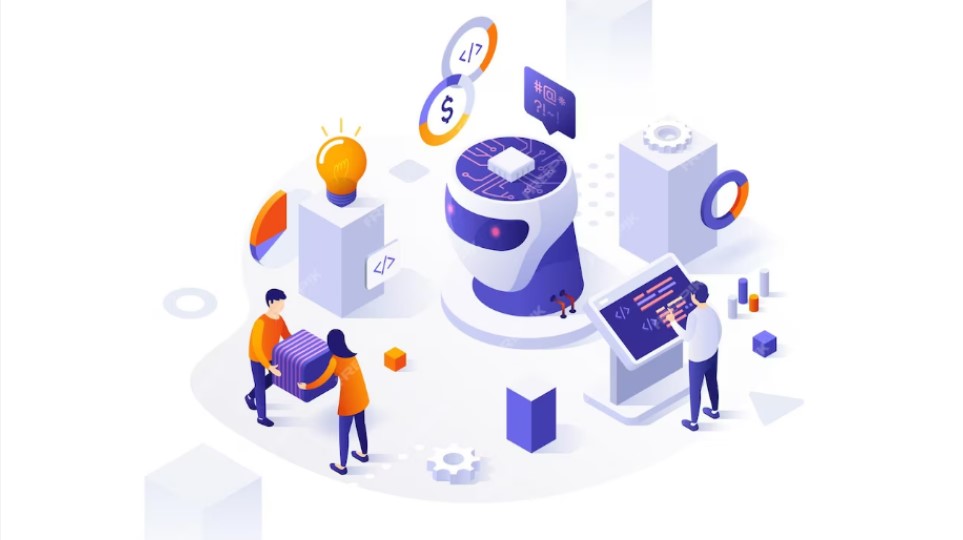
Key Features
The Best AI Tools for Businesses come with a variety of features that cater to different needs.
Here are some of the main features you should look for:
- Automation Capabilities: The ability to automate routine tasks is a hallmark of the Best AI Tools for Businesses.
- Data Analysis: Advanced data analytics that can process and make sense of large amounts of data.
- Machine Learning: Tools that can learn and improve from experience, offering better predictions and insights.
- Integration: Seamless integration with existing systems is crucial for the Best AI Tools for Businesses.
- User-Friendly Interface: Ease of use is a key feature, making these tools accessible to all levels of users.
Industry-Specific AI Tools
AI Tools by Industry: Different industries have unique needs, and the Best AI Tools for Businesses are tailored to meet these requirements.
For example, healthcare businesses might benefit from AI tools like IBM Watson Health for diagnostics, while retail businesses might use tools like Dynamic Yield for personalized marketing.
Case Studies: In the healthcare industry, AI tools have been used to predict patient outcomes and optimize treatment plans. Retailers have leveraged AI for inventory management and personalized customer experiences.
By selecting industry-specific AI tools, businesses can achieve more precise and impactful results.

Why Are AI Tools Important for Businesses?
- Efficiency: The Best AI Tools for Businesses can significantly improve operational efficiency by automating mundane tasks.
- Cost-Effectiveness: Businesses save on labor costs and reduce human error with the Best AI Tools for Businesses.
- Data-Driven Decisions: These tools enable businesses to make informed decisions based on data analysis.
- Scalability: The Best AI Tools for Businesses grow with your business, offering scalable solutions.
- Competitive Edge: Staying ahead in the market is easier with the Best AI Tools for Businesses.
AI and Data Security
Data Privacy Concerns: With the increasing use of AI tools, businesses must be vigilant about data security. The Best AI Tools for Businesses are equipped with advanced security features that protect sensitive data from breaches.
It’s crucial to understand how these tools handle data and ensure they comply with your business’s security policies.
Compliance with Regulations: Many industries are governed by strict data protection regulations like GDPR in Europe and CCPA in California. The Best AI Tools for Businesses should offer compliance features that help businesses adhere to these regulations.

Choosing tools that prioritize data security and regulatory compliance is essential for protecting your business and maintaining customer trust.
Top Tools: What Are the Best AI Tools Available for Businesses in 2024?
1. ChatGPT by OpenAI
ChatGPT by OpenAI has emerged as one of the most versatile AI tools for businesses.
Initially launched as a conversational AI model, it has evolved into a comprehensive assistant capable of handling tasks across various business functions, including customer support, content creation, and even complex problem-solving.
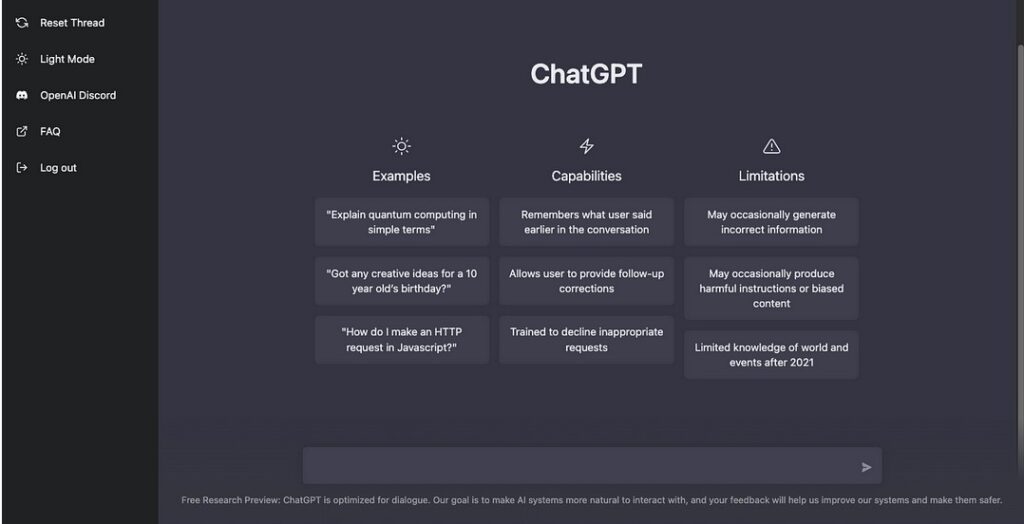
Powered by the advanced GPT-4 model, ChatGPT delivers accurate, context-aware responses, making it an indispensable tool for businesses looking to automate and enhance their operations.
Features:
- Natural language processing
- Contextual understanding
- Multi-lingual support
- API integration capabilities
- Customizale response behaviors
User Experience:
Businesses using ChatGPT often praise its user-friendly interface and the ease with which it can be integrated into existing workflows.
Whether deployed as a chatbot on a website or integrated into a customer support system, ChatGPT is intuitive and requires minimal training.
Its ability to handle complex queries and provide meaningful responses enhances both customer satisfaction and operational efficiency.
Pros:
- Highly versatile and adaptable across industries
- Supports multiple languages
- Continuously improving with updates
- Easily integrates with existing systems
Cons:
- Requires clear instructions for best performance
- May produce less accurate results for highly specialized queries
- Potential privacy concerns with sensitive data
2. Gemini by Google
Gemini is Google’s latest AI offering, designed to compete directly with other leading AI models.
Unlike traditional AI tools, Gemini is a multimodal model, meaning it can handle text, images, audio, and video inputs, making it incredibly versatile for businesses that require diverse content generation capabilities.

Integrated with Google Workspace, Gemini is an ideal choice for businesses already within the Google ecosystem, offering seamless collaboration and productivity enhancements.
Features:
- Multimodal processing (text, image, audio, video)
- Integration with Google Workspace
- Advanced natural language understanding
- Real-time content generation
- Cross-platform accessibility
User Experience:
Businesses that leverage Google’s ecosystem will find Gemini particularly user-friendly, as it integrates smoothly with existing Google tools like Docs, Sheets, and Drive.
The interface is clean, and the model’s multimodal capabilities mean that businesses can generate a wide variety of content types without needing separate tools, streamlining workflows and enhancing productivity.
Pros:
- Seamless integration with Google Workspace
- Handles multiple types of content
- High accuracy in content generation
- Scalable across different business sizes
Cons:
- Best suited for businesses already using Google services
- May require significant computing resources for extensive use
- Limited customization options compared to other AI models
3. Motion
Motion is an AI-powered productivity tool designed to optimize task management and scheduling for businesses.
By automatically organizing tasks based on priority, deadlines, and availability, Motion helps businesses and teams maximize productivity.
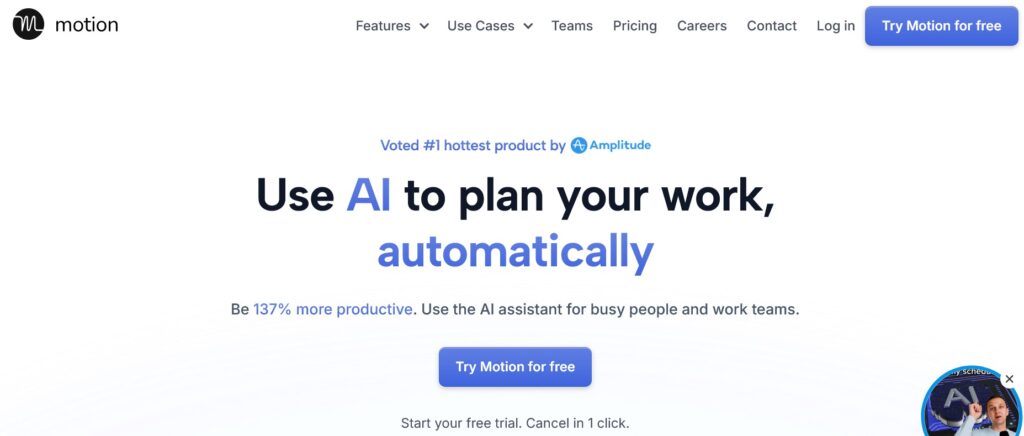
It’s particularly valuable for businesses with complex schedules or multiple overlapping projects, as it ensures that important tasks are completed on time without overloading team members
Features:
- AI-driven task scheduling
- Calendar management
- Task prioritization based on deadlines and importance
- Integration with popular calendar apps
- Time-blocking for focused work
User Experience:
Users of Motion appreciate its ability to take the guesswork out of scheduling.
The AI quickly adapts to changes, rescheduling tasks and meetings as needed to ensure optimal productivity.
The interface is intuitive, and the integration with existing calendar systems makes it easy for businesses to adopt without significant changes to their current workflows.
Pros:
- Automatically adjusts schedules in real-time
- Reduces the need for manual planning
- Integrates well with popular calendar apps
- Enhances productivity by preventing overbooking
Cons:
- May require initial setup time to configure properly
- Limited customization for task categorization
- Best suited for teams rather than individual use
4. Descript
Descript is a powerful AI tool for video and audio editing that has gained popularity among businesses that create multimedia content.
What sets Descript apart is its unique approach to editing—allowing users to edit audio and video files by simply editing the text transcript.

This revolutionary method makes the editing process faster and more accessible, even for those without traditional video editing skills.
Features:
- Text-based video and audio editing
- Automatic transcription
- Screen recording and multitrack editing
- Overdub feature for voice replacement
- Integration with popular media platforms
User Experience:
Descript’s text-based editing system is a game-changer for businesses that regularly produce video and audio content.
The learning curve is minimal, and the platform is designed to be user-friendly even for beginners.
Businesses benefit from the ability to quickly edit content without needing deep technical knowledge, significantly speeding up the production process.
Pros:
- Simplifies the editing process
- Suitable for beginners and professionals alike
- Time-saving with automatic transcription and overdub features
- Supports multiple media formats
Cons:
- Limited advanced editing features compared to traditional software
- The quality of Overdub depends on the input voice
- Can be resource-intensive on lower-end computers
5. Jasper
Jasper is a leading AI-powered content creation tool that helps businesses generate high-quality marketing content efficiently.
Whether it’s blog posts, social media content, or email campaigns, Jasper’s AI can generate copy that aligns with your brand’s voice and style.
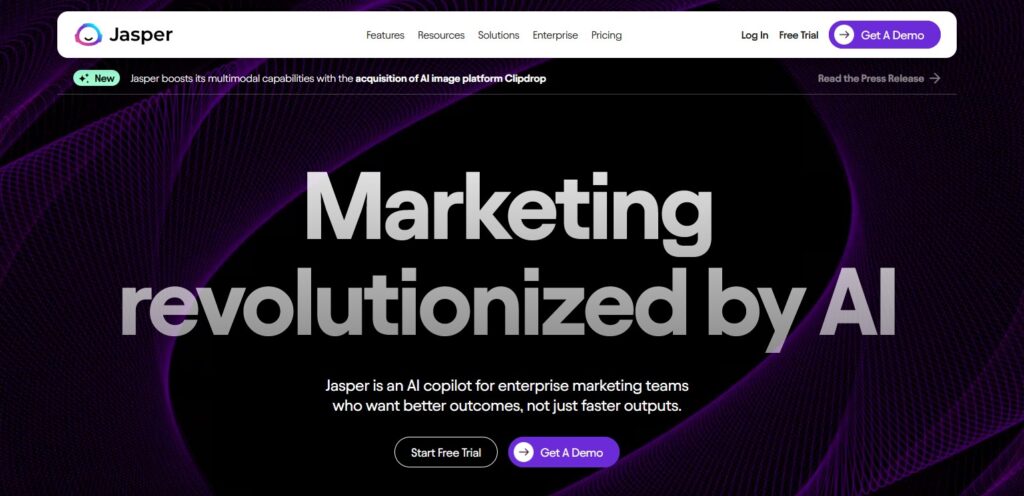
It’s particularly useful for businesses looking to scale their content marketing efforts without significantly increasing their team size.
Features:
- AI-driven content generation
- Multiple writing styles and tones
- Integration with major content management systems (CMS)
- Templates for various content types
- Real-time SEO recommendations
User Experience:
Jasper’s user interface is designed to be straightforward, making it easy for content creators to jump in and start producing high-quality content.
The tool provides real-time suggestions and optimizations, which are particularly valuable for maintaining SEO best practices.
Jasper’s adaptability to different writing styles and tones ensures that businesses can maintain a consistent brand voice across all content.
Pros:
- Generates content quickly and efficiently
- Adapts to different writing styles and tones
- Helps maintain SEO best practices
- Easy integration with CMS platforms
Cons:
- May require manual editing for highly specialized content
- Higher learning curve for advanced features
- Pricing may be steep for small businesses
6. Frase
Frase is an AI-powered SEO and content optimization tool designed to help businesses improve their search engine rankings.
By analyzing top-performing web pages and generating content briefs, Frase enables content creators to craft well-optimized articles that resonate with their target audience.

It’s a must-have tool for businesses focused on content marketing and organic search growth.
Features:
- AI-generated content briefs
- SEO analysis and optimization
- Content research and competitive analysis
- Topic modeling and keyword suggestions
- Integration with popular CMS platforms
User Experience:
Frase offers a seamless experience for content creators and SEO professionals.
Its ability to generate detailed content briefs and provide real-time SEO suggestions makes the content creation process more efficient and targeted.
Users appreciate the actionable insights provided by Frase, which help ensure that content not only ranks well but also meets the needs of the audience.
Pros:
- Streamlines content research and creation
- Provides real-time SEO suggestions
- Integrates easily with CMS platforms
- Helps improve search engine rankings
Cons:
- Can be overwhelming for beginners
- Some features may require a higher pricing tier
- Requires regular updates to maintain SEO best practices
7. Clari
Clari is an AI-driven revenue operations platform that helps businesses optimize their sales processes.
By analyzing data across the sales pipeline, Clari provides valuable insights and forecasts, enabling sales teams to identify risks, capitalize on opportunities, and make data-driven decisions.
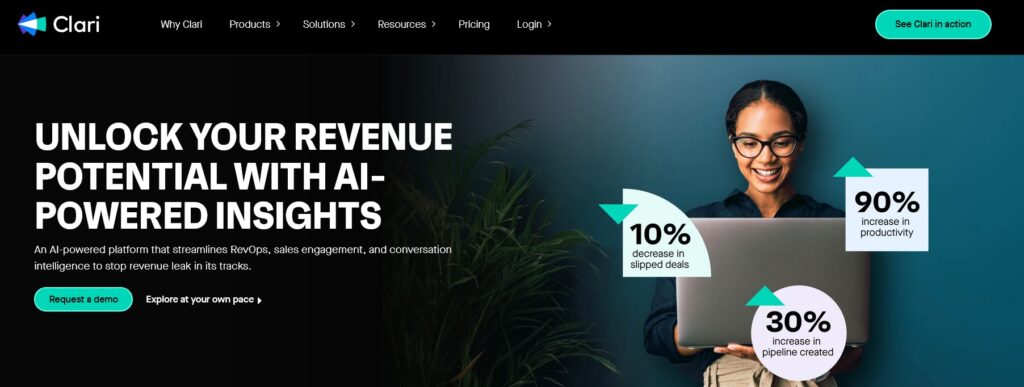
It’s particularly useful for large sales organizations that need to streamline operations and improve predictability.
Features:
- Sales pipeline analysis
- AI-driven forecasting
- Risk identification and management
- Revenue analytics and reporting
- Integration with CRM systems
User Experience:
Clari’s user interface is designed to provide clear, actionable insights that sales teams can quickly act upon.
The platform integrates seamlessly with CRM systems, allowing for real-time data analysis and forecasting.
Users appreciate the predictive capabilities of Clari, which help them stay ahead of potential challenges and optimize their sales strategies.
Pros:
- Provides accurate sales forecasts
- Identifies risks and opportunities in real-time
- Enhances collaboration across sales teams
- Integrates well with existing CRM systems
Cons:
- Best suited for larger sales organizations
- Pricing may be prohibitive for smaller businesses
- Requires proper training to fully utilize its features
8. Fireflies.ai
Fireflies.ai is a cutting-edge AI tool designed to improve meeting productivity through automated transcription and note-taking.
The tool records meetings, transcribes conversations in real-time, and allows users to search and highlight key points, making it an indispensable resource for businesses that rely on frequent meetings and collaborative discussions.

It integrates seamlessly with popular conferencing platforms like Zoom and Microsoft Teams.
Features:
- Automated transcription of meetings
- Real-time recording and note-taking
- Searchable transcripts
- Integration with Zoom, Google Meet, and Microsoft Teams
- Collaborative features for sharing highlights and action items
User Experience:
Fireflies.ai is praised for its simplicity and effectiveness.
Users appreciate how it frees them from taking notes during meetings, allowing them to focus fully on the conversation.
The tool’s integration with major conferencing platforms ensures that transcripts are accurate and accessible, making post-meeting follow-ups much easier.
Pros:
- Saves time by automating transcription
- Easy integration with popular conferencing tools
- Enhances collaboration with searchable transcripts
- Simple to use with minimal setup required
Cons:
- Accuracy can vary depending on audio quality
- Limited advanced editing features in transcripts
- Requires a stable internet connection for real-time transcription
9. HubSpot’s AI Tools
HubSpot has integrated AI into its suite of marketing, sales, and service tools, enhancing its capabilities and making it easier for businesses to automate processes and create personalized customer experiences.
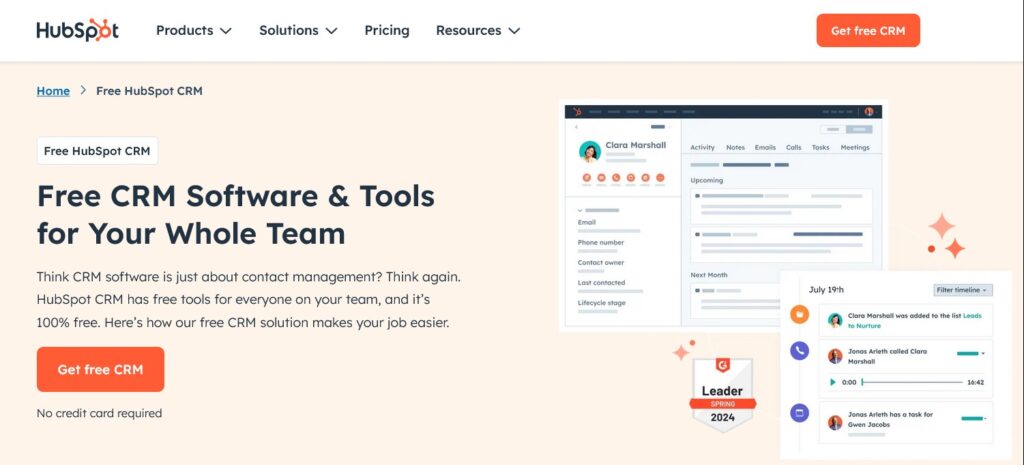
These AI tools are designed to optimize everything from email marketing to CRM management, helping businesses grow and scale efficiently.
HubSpot’s AI tools are particularly useful for businesses that already use HubSpot’s platform, as they seamlessly integrate with existing workflow
Features:
- AI-powered email marketing and automation
- Predictive lead scoring
- Personalized content creation
- CRM integration and optimization
- AI-driven customer service bots
User Experience:
Users of HubSpot’s AI tools appreciate the platform’s ability to centralize and automate various business functions.
The AI-driven insights help businesses tailor their marketing strategies and improve customer engagement.
The tools are easy to use, even for those without technical expertise, and the seamless integration with HubSpot’s CRM ensures that all data is synchronized across the platform.
Pros:
- Comprehensive suite of tools for marketing, sales, and service
- Seamless integration with HubSpot’s CRM
- AI-driven personalization and automation
- User-friendly interface
Cons:
- Primarily benefits businesses already using HubSpot
- Higher pricing for advanced features
- Limited customization outside the HubSpot ecosystem
10. Durable
Durable is an AI-powered website builder that allows businesses to create professional, SEO-optimized websites quickly and with minimal effort.
It’s particularly appealing to small businesses and entrepreneurs who need a web presence but lack the technical skills or resources to build a site from scratch.
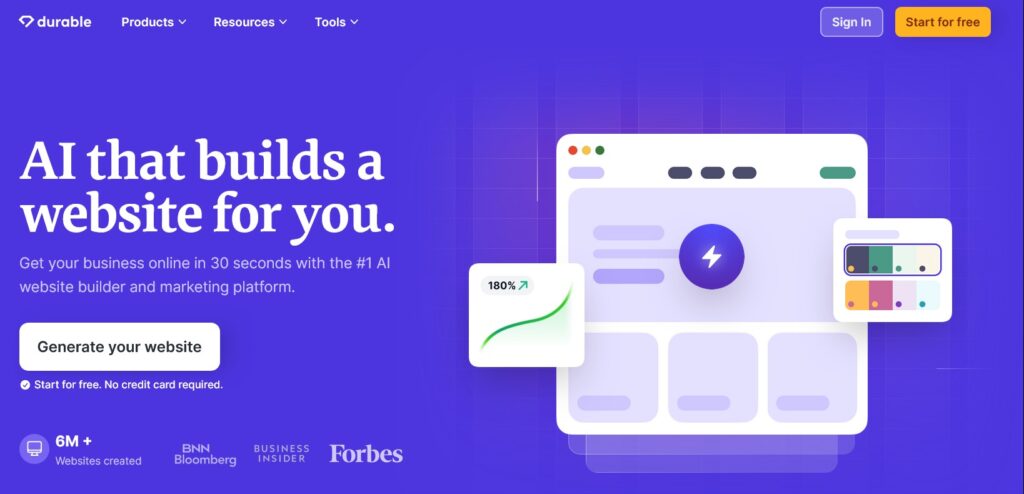
Durable’s AI assists with everything from layout design to content creation, ensuring that your website is not only attractive but also effective at driving traffic and conversions
Features:
- AI-driven website design
- SEO optimization tools
- Customizable templates
- Integrated marketing tools
- User-friendly drag-and-drop interface
User Experience:
Durable is lauded for its ease of use, allowing even those with no web development experience to create professional-grade websites.
The AI’s ability to suggest and implement SEO best practices is a significant advantage for businesses looking to improve their online visibility.
Users also appreciate the integration of marketing tools, which help in driving traffic and managing leads directly from the website.
Pros:
- Simplifies the website creation process
- Built-in SEO tools for improved visibility
- Affordable for small businesses
- Fast setup with customizable templates
Cons:
- Limited design flexibility compared to custom websites
- May not support complex e-commerce needs
- Primarily suited for small to medium-sized businesses
11. Writersonic
Writersonic is an AI-powered writing assistant designed to help businesses create high-quality content quickly and efficiently.
It’s an excellent tool for generating blog posts, social media content, ad copy, and more.
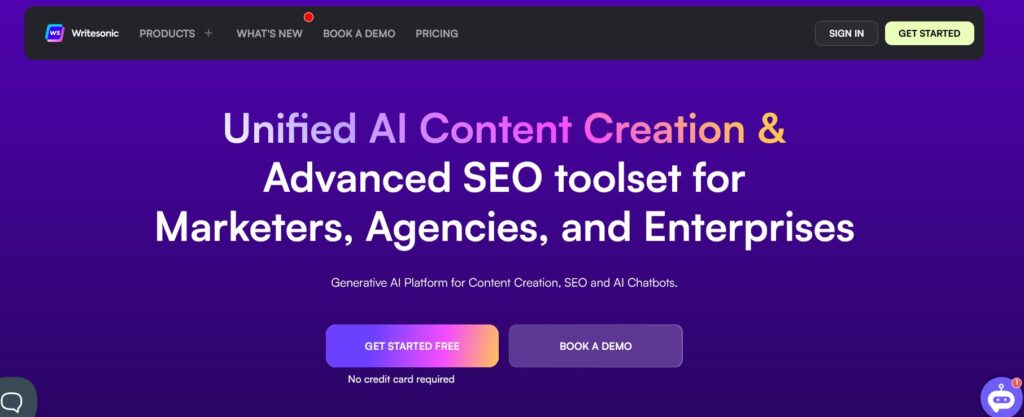
Writersonic’s AI can mimic various writing styles and tones, making it versatile enough to meet the content needs of different businesses.
It’s particularly useful for content marketers and agencies that need to produce large volumes of content without sacrificing quality.
Features:
- AI-driven content generation
- Supports multiple writing styles and tones
- SEO-friendly content creation
- Integration with content management systems
- Real-time feedback and editing tools
User Experience:
Writersonic’s user-friendly interface and intuitive design make it accessible to content creators of all skill levels.
The AI’s ability to generate content that aligns with SEO best practices is a significant benefit, ensuring that the content not only reads well but also performs well in search engines.
Users appreciate the real-time feedback feature, which helps refine and polish content before publishing.
Pros:
- Speeds up content creation processes
- Produces SEO-friendly content
- Adapts to different writing styles and tones
- Easy to integrate with CMS platforms
Cons:
- May require manual editing for highly specialized topics
- Higher pricing tiers may be needed for advanced features
- Some users find the AI-generated content lacking in creativity
Features Comparison: How Do These Tools Compare in Terms of Features?
Here’s a comparison of the Best AI Tools for Businesses based on their features:
- Automation: Motion vs. Jasper vs. Frase
- Data Analysis: Clari vs. Gemini
- Machine Learning: ChatGPT vs. Jasper
- Integration: Gemini vs. HubSpot
- Ease of Use: Motion vs. Durable
Ease of Use: Which AI Tools Are the Easiest to Use?
The Best AI Tools for Businesses vary in terms of ease of use:
- Motion: Rated the highest for user-friendliness.
- Jasper: Easy to use with a minimal learning curve.
- Fireflies.ai: Simple setup and integration with existing tools.
Pricing: What Are the Pricing Options for These Tools?
Here’s an overview of the pricing for the Best AI Tools for Businesses:
- ChatGPT: Free tier available; premium plans starting at $20/month.
- Gemini: Integrated with Google Workspace, pricing based on usage.
- Motion: Pricing starts at $19/month.
- Descript: Free plan available; pro plan starts at $12/month.
- Jasper: Pricing starts at $49/month.
- Frase: Plans start at $14.99/month.
- Clari: Custom pricing based on business size.
- Fireflies.ai: Free tier available; premium plans starting at $10/user/month.
- HubSpot: Custom pricing depending on features.
- Durable: Pricing starts at $29/month.
- Writersonic: Free tier available; premium plans start at $19/month.
What Are Some Examples of Businesses Successfully Using These AI Tools?
Businesses across various industries have successfully implemented the Best AI Tools for Businesses:
- Company A: Improved operational efficiency by 30% using Motion.
- Company B: Reduced content creation time by 40% with Jasper.
- Company C: Enhanced customer support and satisfaction using ChatGPT.
Choosing the Right Tool: How Do You Choose the Best AI Tool for Your Business?
Selecting the Best AI Tools for Businesses depends on your specific needs:
- Identify Your Needs: Determine what you need from the Best AI Tools for Businesses.
- Budget: Consider your budget when choosing among the Best AI Tools for Businesses.
- Scalability: Ensure the tool can grow with your business.
- User Experience: Choose tools that are easy to implement and use.
FAQ Section (Best AI Tools for Businesses)
Q1: What are AI tools?
A1: AI tools are software applications that use artificial intelligence to perform tasks such as automation, data analysis, content creation, and more. They help businesses increase efficiency, reduce costs, and make data-driven decisions.
Q2: How do I choose the best AI tool for my business?
A2: To choose the best AI tool for your business, consider your specific needs, budget, scalability, and user experience. Test the tools during free trials to ensure they meet your requirements.
Q3: Are AI tools expensive?
A3: The cost of AI tools varies widely depending on the features and the provider. Some tools offer free plans with basic features, while others have premium pricing based on usage or advanced capabilities.
Q4: Can small businesses benefit from AI tools?
A4: Yes, small businesses can benefit significantly from AI tools. They can automate repetitive tasks, improve decision-making, and offer insights that would otherwise require significant time and resources.
Q5: Is AI safe to use in business operations?
A5: AI is generally safe to use, but it’s important to ensure that the tools are implemented correctly, with a focus on data privacy and security. Regular updates and vendor support are also crucial for maintaining safety.



